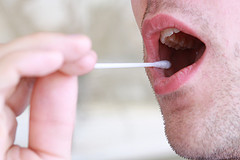Is it legal for the police to take a cheek swab if you’re arrested?

In 2009, 26-year-old Alonzo King was arrested for assault. At the police station, an officer took a swab of DNA from his cheek and ran it through a database. The results matched his DNA to an unsolved rape that occurred six years earlier. King was convicted of the rape and sentenced to life in prison. He appealed the conviction up the appellate ladder to the U.S. Supreme Court.
In June, 2013, the Court ruled 5 to 4 upholding the conviction and sentence.* King challenged the cheek swab claiming it was a search and required a search warrant. The Court disagreed holding that taking a swab inside a person’s cheek is a minimal intrusion that presents no threat to one’s health or safety. It is not a surgical intrusion and has become as routine as fingerprinting and taking a booking photo. The Court referred to the procedure as “a light touch.” As such, taking DNA cheek swabs of an arrestee without a search warrant for a violent or serious crime does not violate the Fourth Amendment.
Since this case involved an adult, the Court had no reason to consider juveniles arrested for violent crimes. In the absence of any comment to the contrary it is assumed this ruling applies to juveniles in custody for serious offenses as categorized under state law. We may see this challenged in the future when a case involving a minor presents itself.
Twenty-eight states and the federal government take DNA swabs from people under arrest. The procedure is not only useful in police investigations but useful in court when judges have to make informed decisions about granting bail and under what conditions.
What do you think of this decision? Some argue that it expands government power over the individual. Others say it invades personal liberties and undermines our constitutional rights. Here is what Justice Scalia wrote for the four dissenting justices:
“The Fourth Amendment forbids searching a person for evidence of a crime when there is no basis for believing the person is guilty of the crime or is in possession of incriminating evidence. That prohibition is categorical and without exception; it lies at the very heart of the Fourth Amendment.” He went on to say “Today’s judgment will, to be sure, have the beneficial effect of solving more crimes; then again, so would the taking of DNA samples from anyone who flies on an airplane (surely the Transportation Security Administration needs to know the “identity” of the flying public), applies for a driver’s license, or attends a public school. Perhaps the construction of such a genetic panopticon is wise. But I doubt that the proud men who wrote the charter of our liberties would have been so eager to open their mouths for royal inspection.” (emphasis added by ATJ.info)
*Maryland v. King, June 3, 2013 United States Supreme Court



